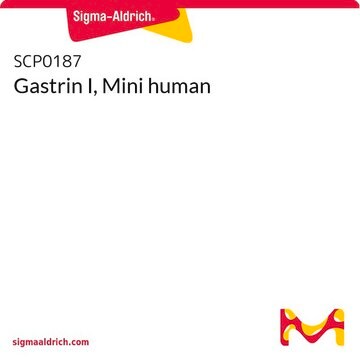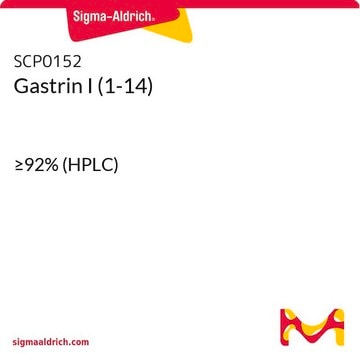G1260
Gastrin II Sulfated
≥95% (HPLC), suitable for ligand binding assays
About This Item
Recommended Products
product name
Gastrin II Sulfated, ≥95% (HPLC)
Quality Level
Assay
≥95% (HPLC)
form
powder
technique(s)
ligand binding assay: suitable
color
white
UniProt accession no.
storage temp.
−20°C
SMILES string
CSCCC(NC(=O)C(Cc1c[nH]c2ccccc12)NC(=O)CNC(=O)C(Cc3ccc(OS(O)(=O)=O)cc3)NC(=O)C(C)NC(=O)C(CCC(O)=O)NC(=O)C(CCC(O)=O)NC(=O)C(CCC(O)=O)NC(=O)C(CCC(O)=O)NC(=O)C(CCC(O)=O)NC(=O)C(CC(C)C)NC(=O)C(Cc4c[nH]c5ccccc45)NC(=O)C6CCCN6C(=O)CNC(=O)C7CCC(=O)N7)C(=O)NC(CC(O)=O)C(=O)NC(Cc8ccccc8)C(N)=O
InChI
1S/C97H124N20O34S2/c1-49(2)39-68(114-95(145)71(43-54-46-100-59-18-11-9-16-57(54)59)116-97(147)73-19-12-37-117(73)76(120)48-102-85(135)60-24-30-74(118)104-60)93(143)110-65(29-35-81(129)130)91(141)109-64(28-34-80(127)128)90(140)108-63(27-33-79(125)126)89(139)107-62(26-32-78(123)124)88(138)106-61(25-31-77(121)122)87(137)103-50(3)84(134)113-69(41-52-20-22-55(23-21-52)151-153(148,149)150)86(136)101-47-75(119)105-70(42-53-45-99-58-17-10-8-15-56(53)58)94(144)111-66(36-38-152-4)92(142)115-72(44-82(131)132)96(146)112-67(83(98)133)40-51-13-6-5-7-14-51/h5-11,13-18,20-23,45-46,49-50,60-73,99-100H,12,19,24-44,47-48H2,1-4H3,(H2,98,133)(H,101,136)(H,102,135)(H,103,137)(H,104,118)(H,105,119)(H,106,138)(H,107,139)(H,108,140)(H,109,141)(H,110,143)(H,111,144)(H,112,146)(H,113,134)(H,114,145)(H,115,142)(H,116,147)(H,121,122)(H,123,124)(H,125,126)(H,127,128)(H,129,130)(H,131,132)(H,148,149,150)
InChI key
WSLIFCVCCVWYQQ-UHFFFAOYSA-N
Gene Information
human ... GAST(2520)
Amino Acid Sequence
Biochem/physiol Actions
Storage Class Code
11 - Combustible Solids
WGK
WGK 3
Flash Point(F)
Not applicable
Flash Point(C)
Not applicable
Personal Protective Equipment
Certificates of Analysis (COA)
Search for Certificates of Analysis (COA) by entering the products Lot/Batch Number. Lot and Batch Numbers can be found on a product’s label following the words ‘Lot’ or ‘Batch’.
Already Own This Product?
Find documentation for the products that you have recently purchased in the Document Library.
Our team of scientists has experience in all areas of research including Life Science, Material Science, Chemical Synthesis, Chromatography, Analytical and many others.
Contact Technical Service
![[Leu15]-Gastrin I human ≥95% (HPLC)](/deepweb/assets/sigmaaldrich/product/structures/153/342/d4cb3dd7-13f1-46cf-8d1f-3907a5de7a83/640/d4cb3dd7-13f1-46cf-8d1f-3907a5de7a83.png)







